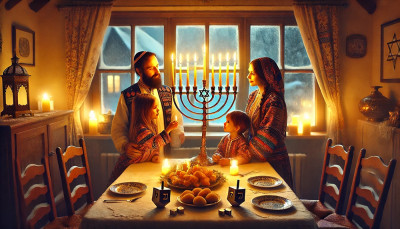
In this week's parshah, we witness the incredible moment when Yosef ascends to great power as the viceroy of Mitzrayim. When Yosef's brothers come to Egypt during the famine seeking food, they stand face-to-face with him yet fail to recognize him. Yosef, however, immediately knows who they are. This raises a profound question: Why didn’t Yosef’s brothers recognize him?
After all, they were his own flesh and blood, raised together and close in age. Yet, despite these shared bonds, they couldn’t fathom that the man standing before them—the ruler of a foreign land—was the same brother they had sold into slavery.
My father, Rav Yitzchok Fingerer shlit"a, offers a powerful explanation based on the Tur: Yosef’s brothers were unable to recognize him not because of a physical change, but because they couldn’t mentally comprehend such a dramatic transformation. They could not imagine that the same "dreamer" they mocked years ago could rise to such greatness. Their inability to see Yosef’s potential clouded their recognition of him.
This teaches us an important lesson: We must dream for others. We must see and believe in the potential of those around us. If we don’t dream about the possibilities for others, we risk failing to truly see them, just as Yosef’s brothers failed to recognize him.
The following story about Rav Aryeh Levin zt”l beautifully illustrates this point. One day, someone saw Rav Levin speaking respectfully to a man who was not wearing a yarmulke. The observer later asked, “Why did you show him such honor? He isn’t religious!” Rav Levin replied, “I’m short, so I couldn’t see his head to notice if he was wearing a yarmulke or not. But what I did see was his heart. He has a beautiful Jewish heart and soul, full of potential. One day, I believe he will wear a yarmulke.”
This is how we must view others—with eyes that see their hearts, their souls, and their possibilities. When we dream for others, we help them become their best selves.
As we celebrate Chanukah, this message resonates deeply. Chanukah reminds us that in a world of darkness, Hashem asks us not to wait for Him to illuminate it but to take the initiative to bring light ourselves. We do this by transforming our homes into places of holiness. The act of lighting the Menorah reminds us that it’s not enough to brighten our own lives—we must share that light with others.
This is why we don’t light the menorah in private spaces like a bedroom. Instead, we light it facing outward, inspiring those around us. Our task as Jews is to take even the smallest flame and use it to dispel immense darkness. One small candle has the power to ignite thousands of others, creating a chain of illumination.
This Chanukah, let’s commit to more than just lighting up our own lives. Let’s dream for others, believe in their potential, and illuminate their lives. After all, the greatest miracle of light is its ability to spread—one soul igniting another until the whole world shines brightly.
The Jewish 'n Joyful podcast, along with its video content, is available on all major streaming platforms. Subscribe today, sponsor a week of Parsha Knowledge, or share your feedback! Don’t miss our newsletter, packed with Torah insights, inspiring stories, and uplifting thoughts on the weekly parshah. Reach us at This email address is being protected from spambots. You need JavaScript enabled to view it. or visit www.parshaknowledge.com for more information.
Aryeh Fingerer is a Torah educator and storyteller with a passion for sharing meaningful insights. He draws inspiration from his father, Rav Yitzchok Fingerer, and aims to help others see the light and potential in themselves and others.By Aryeh Fingerer
Dreaming Of Potential: A Lesson from Yosef and Chanukah
Typography
- Smaller Small Medium Big Bigger
- Default Helvetica Segoe Georgia Times
- Reading Mode




